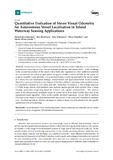JavaScript is disabled for your browser. Some features of this site may not work without it.
| dc.contributor.author | Kriechbaumer, Thomas | |
| dc.contributor.author | Blackburn, Kim | |
| dc.contributor.author | Breckon, Toby P. | |
| dc.contributor.author | Hamilton, Oliver | |
| dc.contributor.author | Rivas Casado, Monica | |
| dc.date.accessioned | 2016-02-10T10:37:51Z | |
| dc.date.available | 2016-02-10T10:37:51Z | |
| dc.date.issued | 2015-12 | |
| dc.identifier.citation | Kriechbaumer, T., Blackburn, K., Breckon, T.P., Hamilton, O. and Rivas Casado, M. 2015. Quantitative evaluation of stereo visual odometry for autonomous vessel localisation in inland waterway sensing applications. Sensors, 15(2), pages 31869-31887. DOI: 10.3390/s151229892 | en_UK |
| dc.identifier.issn | 1424-8220 | |
| dc.identifier.uri | https://dx.doi.org/10.3390/s151229892 | |
| dc.identifier.uri | http://dspace.lib.cranfield.ac.uk/handle/1826/9689 | |
| dc.description.abstract | Autonomous survey vessels can increase the efficiency and availability of wide-area river environment surveying as a tool for environment protection and conservation. A key challenge is the accurate localisation of the vessel, where bank-side vegetation or urban settlement preclude the conventional use of line-of-sight global navigation satellite systems (GNSS). In this paper, we evaluate unaided visual odometry, via an on-board stereo camera rig attached to the survey vessel, as a novel, low-cost localisation strategy. Feature-based and appearance-based visual odometry algorithms are implemented on a six degrees of freedom platform operating under guided motion, but stochastic variation in yaw, pitch and roll. Evaluation is based on a 663 m-long trajectory (>15,000 image frames) and statistical error analysis against ground truth position from a target tracking tachymeter integrating electronic distance and angular measurements. The position error of the feature-based technique (mean of ±0.067 m) is three times smaller than that of the appearance-based algorithm. From multi-variable statistical regression, we are able to attribute this error to the depth of tracked features from the camera in the scene and variations in platform yaw. Our findings inform effective strategies to enhance stereo visual localisation for the specific application of river monitoring. | en_UK |
| dc.description.sponsorship | Environmental Agency, EPSRC | en_UK |
| dc.language.iso | en | en_UK |
| dc.publisher | MDPI (Multidisciplinary Digital Publishing Institute) | en_UK |
| dc.rights | This is an open access article distributed under the Creative Commons Attribution License (CC BY) which permits unrestricted use, distribution, and reproduction in any medium, provided the original work is properly cited. Attribution 4.0 International (CC BY 4.0) You are free to: Share — copy and redistribute the material in any medium or format, Adapt — remix, transform, and build upon the material for any purpose, even commercially. The licensor cannot revoke these freedoms as long as you follow the license terms. Under the following terms: Attribution — You must give appropriate credit, provide a link to the license, and indicate if changes were made. You may do so in any reasonable manner, but not in any way that suggests the licensor endorses you or your use. Information: No additional restrictions — You may not apply legal terms or technological measures that legally restrict others from doing anything the license permits. | en_UK |
| dc.subject | Visual odometry | en_UK |
| dc.subject | River monitoring | en_UK |
| dc.subject | Stereo vision | en_UK |
| dc.subject | Autonomous watercraft | en_UK |
| dc.subject | Survey vessel | en_UK |
| dc.subject | Autonomous river navigation | en_UK |
| dc.subject | GPS-denied environments | en_UK |
| dc.title | Quantitative evaluation of stereo visual odometry for autonomous vessel localisation in inland waterway sensing applications | en_UK |
| dc.type | Article | en_UK |
Files in this item
This item appears in the following Collection(s)
-
Staff publications (SWEE) [2822]
